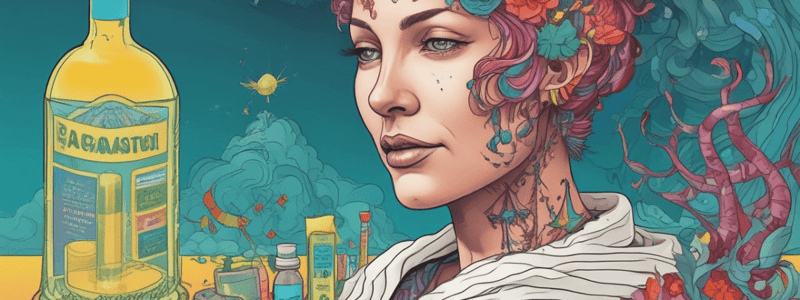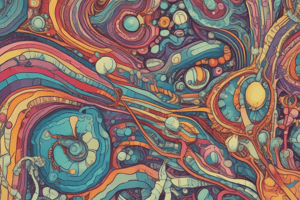Podcast
Questions and Answers
Match the following classes of psychoactive drugs with their descriptions:
Match the following classes of psychoactive drugs with their descriptions:
Stimulants = Increase activity in opioid receptor neurons producing euphoria Depressants = Reduce activity of the Central Nervous System Opioids = Alter sensation and perception Hallucinogens = Block the reuptake of dopamine, norepinephrine, and serotonin
Match the following psychoactive drug effects with their corresponding drug class:
Match the following psychoactive drug effects with their corresponding drug class:
Stimulants = Slower breathing and constipation Depressants = Euphoria and analgesia Opioids = Altered sensory experiences Hallucinogens = Reduced CNS activity
Match the psychoactive drug class with its mechanism of action:
Match the psychoactive drug class with its mechanism of action:
Stimulants = Alters sensation and perception Depressants = Blocks the reuptake of neurotransmitters Opioids = Increases activity in opioid receptor neurons Hallucinogens = Reduces activity in the CNS
Match the following drugs with their effects:
Match the following drugs with their effects:
Match the class of drug with its key characteristic:
Match the class of drug with its key characteristic:
Flashcards are hidden until you start studying
Study Notes
Stimulants
- Psychoactive drugs that enhance alertness and energy levels.
- Function by blocking the reuptake of neurotransmitters: dopamine, norepinephrine, and serotonin.
- Increased presence of these neurotransmitters in synapses results in heightened mood and focus.
Depressants
- A class of drugs that diminish overall brain and body activity.
- Primarily depress the Central Nervous System (CNS), leading to relaxation and reduced anxiety levels.
- Commonly used for conditions such as insomnia, anxiety, and muscle spasms.
Opioids
- Chemicals that activate opioid receptors in the brain and digestive system.
- Effects include euphoria (intense happiness), analgesia (pain relief), slower breathing, and constipation.
- Often utilized in pain management, but carry a risk of addiction and overdose.
Hallucinogens
- Psychoactive substances that disrupt normal sensory processing.
- Alter sensations and perceptions, leading to experiences that may seem unreal or distorted.
- Can evoke visual and auditory hallucinations, affecting thoughts, emotions, and self-perception.
Studying That Suits You
Use AI to generate personalized quizzes and flashcards to suit your learning preferences.




